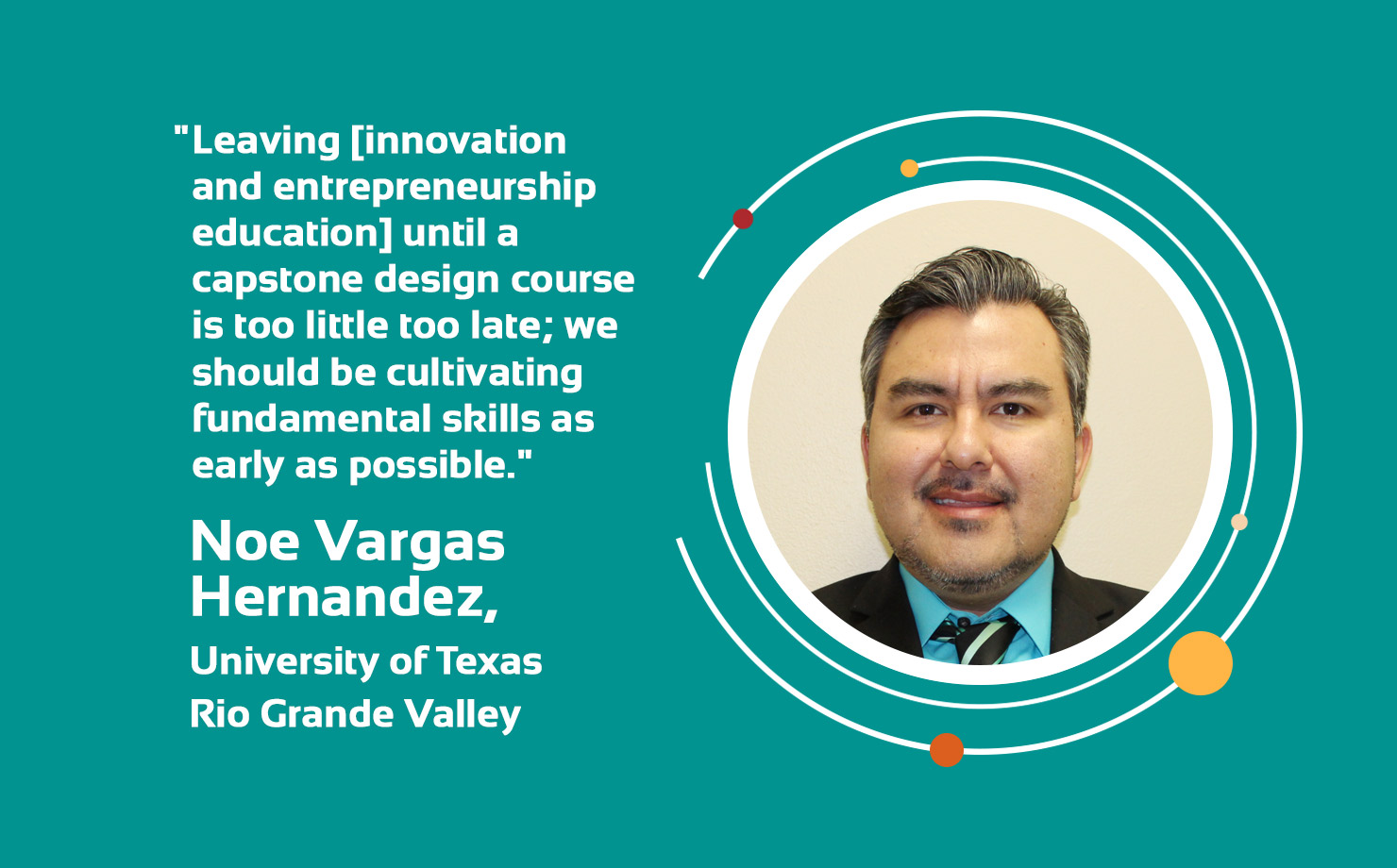
Our Faculty Spotlight series highlights educators within the VentureWell network who are doing good work—faculty members who are catalyzing change in higher education and inspiring students to impact the world through invention. This month’s faculty spotlight is Noe Vargas Hernandez, Assistant Professor of Mechanical Engineering in the College of Engineering and Computer Science at the University of Texas Rio Grande Valley. He’s served as a Principal Investigator for teams participating in the National Science Foundation (NSF) I-Corps program. Noe is devoted to better integrating vital sustainability, entrepreneurship, and design practices into engineering curriculum. He received a Faculty Grant to create competitions solving real-life local challenges to develop innovation skills in engineering students.
how did you get interested in teaching entrepreneurship?
I became interested in entrepreneurship through sustainable design. Initially, it meant focusing on the environment, and gradually I realized that true sustainability involves people, profit, and planet. Also, from the engineering design perspective, I was always interested in product innovation, and this has a natural connection to entrepreneurship, too. Today, I am interested in developing innovation and entrepreneurship skills in underrepresented engineering students.
what is your favorite thing about teaching?
The discovery process, walking with the student through the design, innovation, and entrepreneurship process and enabling their creativity. Helping students build their confidence, starting a design project from scratch and ending with an amazing product solution; that is a great confidence building experience for the students.
where would you like to see the field of entrepreneurship in five years?
I would like to see the field of entrepreneurship as a more welcoming, enabling opportunity for everyone, and in particular for underrepresented communities. Entrepreneurship is intrinsically challenging; we should work towards understanding and solving for the obstacles underrepresented communities face.
what are the challenges you’re tackling in your work today?
There is a need for well-rounded engineers with environmental consciousness, entrepreneurial thinking, and social agency. One challenge I’m working to address is how to disseminate design, innovation, and entrepreneurship learning experiences through the engineering curricula and beyond into K-12. Leaving everything until a capstone design course is too little too late; we should be cultivating fundamental skills as early as possible.
what publications on entrepreneurship and innovation have you been reading lately?
On entrepreneurship, I am currently reading The Innovation Code by Jeff Degraff, which explains how diverse perspectives and backgrounds in teams can spark productive conflict that leads to innovative hybrid solutions—in particular, I like how it embraces conflict and chaos as part of the innovation process. Business Model for Teams by Tim Clark and Bruce Hazen also makes an interesting point acknowledging the importance of team composition and diversity. On innovation, I am currently reading Creating Breakthrough Products by Jonathan Cagan and Craig Vogel, which explains how to identify product opportunity gaps.
what’s your most useful classroom activity or assignment?
During the spring 2020 semester, courses migrated online because of the COVID-19 pandemic. Faculty and students had to quickly adapt to this reality. At least once every semester I send an individualized email to each of my students asking them how they are doing. In our current situation, I have sent a variation of the question: “how are you doing through this pandemic?”. This simple question took a deeper meaning; I received a variety of replies ranging from gloomy to optimistic. Their answers revealed the variety of situations and emotions they were experiencing, and this increased my awareness of what the student were going through, their fears, anxieties, and hopes. So, I must say that my most useful activity is to ask students simply how they are doing.
VentureWell Faculty Grants provide up to $30,000 to help fund and support faculty with innovative ideas to create new or transform existing courses and programs to help students develop novel, STEM-based inventions and gain the necessary entrepreneurial skills needed to bring these ideas to market.